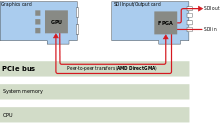AMD FirePro
 | |
| Design firm | Advanced Micro Devices |
|---|---|
| Type | Professional workstations |
AMD FirePro was AMD's brand of graphics cards intended for use in workstations and servers running professional Computer-aided design (CAD), Computer-generated imagery (CGI), Digital content creation (DCC), and High-performance computing/GPGPU applications. The GPU chips on FirePro-branded graphics cards are identical to the ones used on Radeon-branded graphics cards. The end products (i.e. the graphics card) differentiate substantially by the provided graphics device drivers and through the available professional support for the software. The product line is split into two categories: "W" workstation series focused on workstation and focusing on graphics and display, and "S" server series focused on virtualization and GPGPU/High-performance computing.
The release of the Radeon Pro Duo in April 2016 and the announcement of the Radeon Pro WX Series in July 2016 marked the succession of Radeon Pro as AMD's professional workstation graphics card solution.[1]
Competitors included Nvidia's Quadro-branded and to some extent Tesla-branded product series and Intel's Xeon Phi-branded products.
Products
Multi-monitor support
AMD Eyefinity supports multi-monitor set-ups. One graphics card can drive up to a maximum of six monitors; the supported number depends on the distinct product and the number of DisplayPort displays. The device driver facilitates the configuration of diverse display group modes.
Differences with the Radeon Line

The FirePro line is designed for compute intensive, multimedia content creation (such as video editors), and mechanical engineering design software (such as CAD programs). Their Radeon counterparts are suited towards video games and other consumer applications. Because they use the same drivers (Catalyst) and are based on the same architectures and chipsets, the major differences are essentially limited to price and double-precision performance. However, some FirePro cards may have major feature differences to the equivalent Radeon card, such as ECC RAM and differing physical display outputs.
Since the 2007 series, high-end and ultra-end FireGL/FirePro products (based on the R600 architecture) have officially implemented stream processing. The Radeon line of video cards, although present in hardware, did not offer any support for stream processing until the HD 4000 series where beta level OpenCL 1.0 support is offered, and the HD 5000 series and later, where full OpenCL 1.1 support is offered.
Heterogeneous System Architecture
HSA is intended to facilitate the programming for stream processing and/or GPGPU in combination with CPUs and DSPs. All models implementing the Graphics Core Next microarchitecture support hardware features defined by the HSA Foundation and AMD has provided corresponding software.
FirePro DirectGMA

Soft-mods
Because of the similarities between FireGL and Radeon cards, some users soft-mod their Radeon cards by using third-party software or automated scripts accompanied with a modified FireGL driver patch, to enable FireGL capabilities for their hardware, effectively getting a cheaper, equivalent, FireGL cards, often with better OpenGL capabilities, but usually half of the amount of video memory. Some variants can also be soft-modded to a FireStream stream processor.
The trend of soft-mods continued with the 2007 series FireGL cards, as follows:
| Radeon product | GPU | Corresponding FireGL soft-mod |
|---|---|---|
| Radeon HD 2900 XT (1 GB GDDR4 version) | R600 XT | FireGL V8600 |
| Radeon HD 2900 GT | R600 GT | FireGL V7600 |
| Radeon HD 2600 XT (512 MB GDDR4 version) | RV630 XT | FireGL V5600 |
| Radeon HD 2600 Pro | RV630 Pro | FireGL V3600 |
| Radeon HD 3850/3870 | RV670 | FireGL V77001 / FireStream 9170 |
| Radeon HD 4870 | RV770 | FirePro V8700 |
| *1 Radeon HD 3850/3870 products do not have the DisplayPort output presented on FireGL V7700 product. | ||
List of pre-ATI FireGL cards
| Year | Manufacturer | Model | Chipset | Memory (RAM) | Bus Type |
|---|---|---|---|---|---|
| 1995[3] | SPEA | FireGL | 3Dlabs GLINT 300SX + S3 86C968/86c868 | 8 MB VRAM + 8-12 MB DRAM | |
| Diamond | FireGL 1000 | 3DLabs Permedia + GLint Delta | 4/8 MB | ||
| Diamond | FireGL 1000 Pro | 3DLabs Permedia 2 | 4/8 MB | ||
| Diamond | FireGL 2000 | 3Dlabs GLINT 300SX + S3 86C968/86c868 | 8 MB VRAM + 8-12 MB DRAM | ||
| Diamond | FireGL 3000 | 3Dlabs Glint 500TX + Glint Delta | 8 MB VRAM+ 8/16/32 MB | ||
| Diamond | FireGL 4000 | Mitsubishi 3Dpro/2MP | 15 3D RAM/ 4-16 CDRAM | ||
| Diamond | FireGL 5000 | Mitsubishi iMPAC-GE | |||
| Diamond | FireGL 1 | IBM Oasis Rasterizer | 32 MB | AGP 2x | |
| Diamond | FireGL 2 | IBM RC1000 (120 MHz) + GT1000 (190 MHz) | 64 MB DDR (120 MHz) | AGP 4x | |
| Diamond | FireGL 3 | IBM RC1000 (120 MHz) + GT1000 (190 MHz) | 128 MB DDR (120 MHz) | AGP 4x Pro | |
| Diamond | FireGL 4 | IBM RC1000 (150 MHz) + GT1000 (205 MHz) | 128 MB DDR (150 MHz) | AGP 4x Pro |
History
The FireGL line was originally developed by the German company Spea Software AG until it was acquired by Diamond Multimedia in late 1995.[4] The first FireGL board used the 3Dlabs GLINT 3D processor chip.[5]
Deprecated brand names are ATI FireGL, ATI FirePro 3D, and AMD FireStream.
In July 2016, AMD announced it would be replacing the FirePro brand with Radeon Pro.[1]
See also
- Nvidia Quadro – Nvidia's competing workstation graphics solution
- Nvidia Tesla – Nvidia's competing GPGPU solution
- Xeon Phi - Intel's competing High-performance computing solution
References
- 1 2 Ung, Gordon Mah (25 July 2016). "AMD introduces a new Radeon Pro WX series to replace FirePro". PC World. Retrieved 26 July 2016.
- ↑ "XDC2014 Alex Deucher: Linux drivers".
- ↑ "GLINT05 SPEA FireGL".
- ↑ "Diamond Multimedia Systems, Inc. Completes Acquisition of Spea Software AG".
- ↑ 1996 press release from 3Dlabs